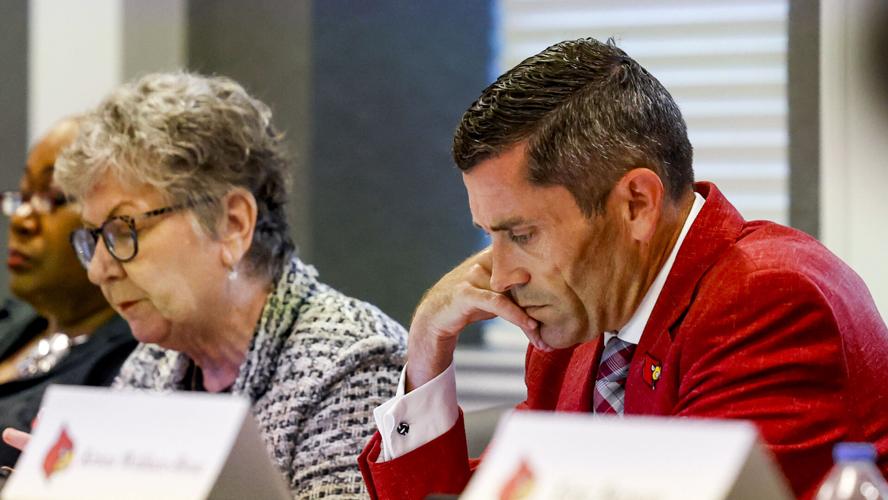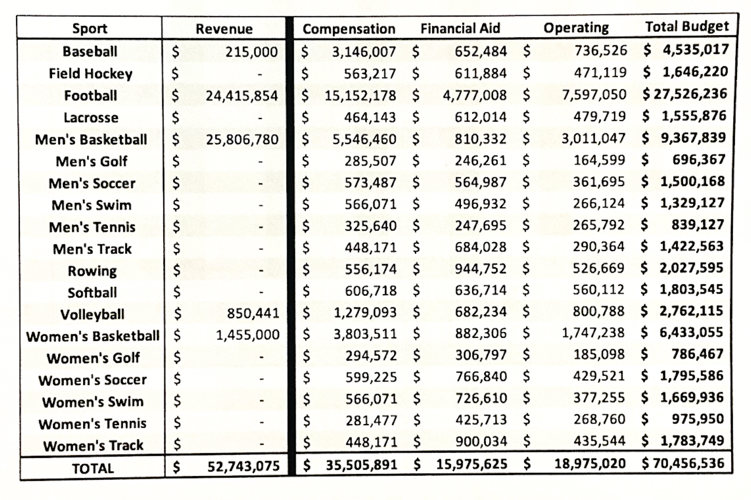LOUISVILLE, Ky. (WDRB) -- The University of Louisville approved a $145 million athletics budget on Friday, marking a slight decrease from 2023-24 as the department not only continues to adjust to the effects of a dip in men's basketball fortunes over the past several seasons and costs associated with that but to higher travel costs and one fewer home football game in the coming season.
Still, athletics director Josh Heird says he's looking forward to better days for basketball — and to a day when many of the one-time type of expenditures from separation agreements and the like are a thing of the past for the department.
U of L absorbed $5.240 million in costs associated with firing men's basketball coach Kenny Payne and hiring his replacement, Pat Kelsey, and will incur $2.5 million in a continuation of those costs next year.
It paid former men's basketball coach Chris Mack $893,000 last year as part of his separation agreement, and will pay him $521,290 next year. It also made a final payment of $2 million to John Schnatter as the result of the termination of his naming rights deal for the football stadium.

A look at projected revenues and expenses for Louisville's athletic teams in 2025.
The school will deal with a half-dozen teams making road trips to California in the wake of ACC expansion and will have only a half-dozen home football games in 2024, with none designated as "premium" games. (Indiana, which bought out of its contract to play at Louisville next season, would have been such a game.)
Not all one-time expenses are bad news. The ACC football championship game appearance piled up $400,000 in additional expenses for the program, and football coaching staff performance bonuses amounted to $750,000. Those are the kinds of "one-time" expenses that Heird doesn't hope are just one time.
The others, however, related to coaching instability, are daunting.
The cash expense of Payne's buyout was $3.4 million in the current year, with another $400,000 to assistant coaches and support staff. Kelsey's buyout at College of Charleston was $1.1 million.
"From an optimistic standpoint, when this athletic department is clicking on all cylinders, it has the ability to generate the revenue that we need relative to the changes that we're going to see moving forward," Heird said. "But in order for us to do all of that, we have to eliminate all the things (buyouts, etc.) that you just mentioned. That's what we're trying really, really hard to do. And I feel like the light is at the end of the tunnel. But such is life, you know, there's probably going to be something that pops up somewhere. But right now, today, I feel like we can see some really positive things happening and we just have to make sure that we eliminate or significantly reduce any of those things that impact us on the expense side."
This will be the last budget meeting of its kind for U of L, which next time around, like all teams in the NCAA's power conferences, will face the prospect of finding in the neighborhood of $20 million to pay athletes. That revenue-sharing settlement is still being hammered out, but Heird said the true cost — because of the elimination of scholarship requirements for various sports and associated changes — means that U of L will need to identify about $15 million in increased revenue or spending cuts to make the total.
That's a process that still is in the early stages. Heird told the board there will be changes in scholarship numbers for some sports. He said that the department will be looking hard at new sources of revenue.
WDRB's Tyler Greever and Eric Crawford attended the University of Louisville Athletic Association's board meeting and discussed takeaways for the financial future of Louisville athletics.
He praised the approach of U of L president Kim Schatzel, who earlier this week spoke to the National Association of Collegiate Director of Athletics conference in Las Vegas on the present and future of college athletics. Afterward, she and Heird held a 30-minute discussion on the changing requirements of the president-athletic director relationship.
Schatzel told that group that in 2022 collegiate athletic revenue was $13.6 billion. Major League Baseball was $10.9 billion. The NBA was $9.9 billion. NHL was just over $7 billion.
"The only league that had more revenue than collegiate athletics was the NFL," she said. "I put that in perspective to realize that this is an industry we're really talking about."
Now, college sports are far more numerous than those limited professional leagues, but in many ways that only increases the challenges.
For Louisville, Heird said, the search is on to meet the coming financial requirement. One such measure was approved on Friday — an increase in football season ticket prices for the 2025 season — including increases that range from $10 in the Flight Deck to $190 in select premium seating areas, with an average season ticket price increase of $67. These increases are in part due to higher sell-thru rates around the stadium, as well as an eight-game home schedule that features Clemson and Kentucky. The price changes alone raise the football ticket revenue projection by more than 12%.
"For me, nothing's off the table," Heird said. "Let's have a conversation about it. You know, some ideas are going to work. Some of them are not going to work. I think one of the big things that we want to try to do as we move forward is — as opposed to creating donor fatigue by saying, 'Hey, we need some money — we want to try to create a more comprehensive package. This is what this athletic department needs to operate. This is the expense tied to it. I'm talking to the donor and the fan. and you know, we just approve football season ticket prices for next year. This is an industry that we know what it's going to cost operate now, right? So how do we come up with that revenue to operate at the level our fans expect us to."
Louisville athletics director Josh Heird breaks down the financial changes seen in the new athletics budget.
In general, Louisville expects to trim $5 million in athletic operating costs in 2025, and a reduction of capital spending by $2 million. On the revenue side, the budget projects a nearly $2 million revenue increase in seat licenses, a $2.2 million increase in unrestricted gifts, a $3 million increase in sponsorships and a $4.7 million increase in conference/NCAA revenue.
The department received $7.9 million in campus support in 2024, and expects to take $5.8 million in 2025.
"There's some presumptions there that basketball is going to do better than it's done the last couple of years," Heird said. "But as I say, if you're not going to be an optimist in this job, then why are you doing this job? I think it's a realistic budget and allows our head coaches and all of our department heads to stay within the budgets that we've outlined for them. I think we're in a good position."
CORRECTION: This story clarifies an earlier version that described the football season-ticket increase as $130 per game, per seat, which left some fans unclear as to the total increase for their tickets.
Copyright 2024 WDRB Media. All Rights Reserved.














